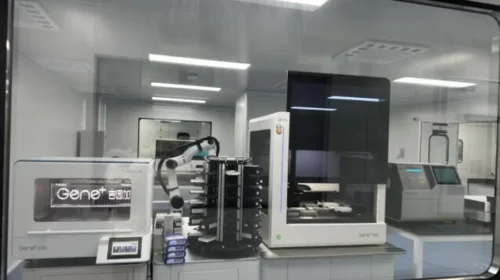Facing cloudy regulation, Smoore prepares back-up plans

The vaping products maker is facing new pressures on both the regulatory and tariff fronts, driving it to explore new products
Key Takeaways:
- Smoore’s profit dropped 43.4% to 192 million yuan in this year’s first quarter, as its vaping products come under growing pressure on various fronts
- Big tobacco is lobbying Washington to impose additional tariffs or ban disposable vaping devices made in China
By Lee Shih Ta
The vaping industry is at once traditional and innovative, offering up a vast market but also one under constant regulatory scrutiny due to its similarities with conventional smoking. Vaping product makers must also compete with regular cigarettes, and policies affecting the newer group can sometimes be cloudy and confusing.
Many vaping companies are feeling the pressure from all sides, including Smoore International Holdings Ltd. (6969.HK), the world’s leader in atomization technology products, whose latest results show its profit went up in smoke in the first quarter, slipping 43.4% year-on-year to 192 million yuan.
The company blamed the disappearing profit mainly on big spending increases all around, including on the administrative, distribution, selling and R&D fronts.
Smoore’s revenue mainly comes from vaping products it sells to global tobacco companies. Such products are mostly e-cigarette devices and their components, including atomizers, smoke bombs, disposable vapes and heat-not-burn devices. The company is also developing a self-branded business and investing in R&D to find uses for atomization technology in beauty and medical therapies.
The company didn’t provide any first-quarter revenue data, but the figure rose 5.3% for all of 2024 to 11.8 billion yuan, even as its profit for the year dropped 20.8% to 1.3 billion yuan. Last year Smoore earned 9.32 billion yuan from business clients, down slightly from 2023, accounting for 79% of total revenue. Revenue from its self-branded business surged 34% to 2.48 billion yuan, making up the remaining 21% of its revenue pie. The company hailed the launch of its “MOYAL” beauty atomization brand in China last year as a major breakthrough.
Despite its falling profits, Smoore’s stock was on fire last year, more than doubling from HK$6.50 at the start of 2024 to HK$14.12 by year-end. It’s given back some of that this year, but still trades above HK$11.
The Chinese vaping market has slumped for several years now after a period of rapid growth. Vapes were officially brought under China’s Tobacco Monopoly Law in 2022, at which time flavored electronic vapes favored by young people were outlawed and all products were required to receive new licenses. The changes prompted Smoore to shift its focus abroad, and overseas revenue accounted for more than 90% of its total last year. As it made the shift, the company returned to revenue growth last year after two years of contraction.
Things have been looking up overseas lately in terms of regulation. The U.S., the world’s biggest vaping market, officially opened up to menthol-flavored products last year. And President Trump promised during his campaign that he would further open up the market if elected, raising expectation for more relaxation. The U.S. Food and Drug Administration’s (FDA) also ramped-up efforts to crack down on unauthorized vapes last year, helping to shore up sales for legal companies like Smoore.
High-stakes stock grants
A stock incentive scheme at the end of last year for founder and Chairman Chen Zhiping may also be supporting the stock. The company granted Chen up to 61 million shares contingent on meeting certain conditions. Under that plan, he will receive 30% of the shares if the company’s average market cap reaches HK$300 billion for 15 consecutive trading days between 2025 and 2030; he will get 60% if it reaches HK$400 billion for 15 consecutive days; and he will get all 61 million shares if it reaches HK$500 billion.
The company’s market cap reached HK$550 billion at its height in January 2021, though it has fallen sharply since then to its current level of HK$63 billion. The option scheme means Chen will be closely watching the company’s stock, as he aims to take Smoore back to its previous heights and claim some or all of the stock grant.
Despite its return to revenue growth and relative stability last year, constantly shifting government policies and geopolitics are leaving question marks hanging over the company. One such cloud could be coming from British American Tobacco (BATS.L), a major Smoore client, which was lobbying the Trump administration to crack down on illegal vapes, including potential bans on the import of devices from China, according to a Reuters report.
U.S. import ban?
British American Tobacco complained that its own legal products typically take several years to enter the market, by which time illegal products have already taken substantial share. Unauthorized disposable vapes, mostly made in China, account for roughly 70% of almost $12.93 billion worth of U.S. vape sales annually, seriously impinging on legal products. To snuff that out, the company is calling on Washington to ban imports of all disposable vapes from China and consider additional tariffs on any other Chinese-made e-cigarettes and smoking alternative products.
Meantime, new U.S. tariffs on Chinese goods entering the country, and the revoking of duty-free treatment for small-packages entering the U.S. from China are also put pressure on the export of Chinese-made e-cigarettes.
That said, Smoore still stands a chance to find a new path through the development of new less controversial products. A case in point is its increasingly popular heat non-burn (HNB) products that are regarded by Chen as a potential new second frontier for the company. In addition, as we’ve previously noted, Smoore is also stepping up spending on its development of beauty and medical products using its atomization technology.
After its recent stock run-up, Smoore’s shares now trade at a price-to-earnings (P/E) ratio of 52 times, higher than RLX Technology’s (RLX.US) 30 times and the 11 times average for the entire tobacco industry. With such an elevated price, investors should be on the watch for a potential correction – a risk that would hurt not only the stock price but take Chen further from receiving any shares under his incentive scheme.
To subscribe to Bamboo Works weekly free newsletter, click here





